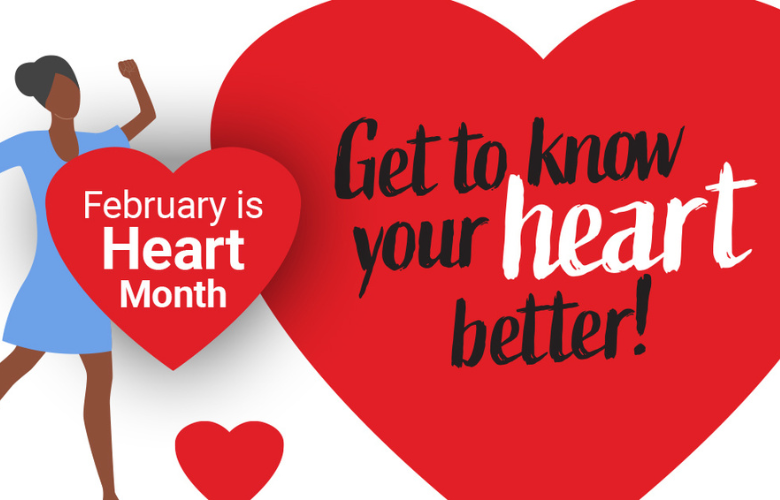February 1, 2023

We often associate the month of February with hearts because of Valentine’s Day. However, there is another reason we should think of hearts in February – it’s American Heart Month, a designated time to advocate for cardiovascular health and raise awareness about heart disease. According to the Centers for Disease Control and Prevention (CDC), one person dies every 34 seconds from heart disease, making this disease the leading cause of death for both men and women of most racial and ethnic groups in the U.S.
Your heart is one of the hardest working muscles in your body and it beats around the clock, only getting a break when you relax or sleep. With so much riding on this essential muscle, it’s important to ensure you’re doing all you can to keep it in good shape. Fortunately, there are many things you can do to show your heart how much you care during American Heart Month and throughout the year. Anyone – at any age – can benefit from these simple tips:
Maintain a healthy diet.
Drinking plenty of water and eating a diet of lower-calorie, nutrient-rich foods can help you control your weight, cholesterol levels and blood pressure, which helps lower your risk of heart disease. A healthy diet is easily achievable by:
- Drinking at least 64 ounces of water each day and avoiding sugary beverages, like sodas, bottled teas, smoothies, adult beverages and fruit juices.
- Filling your plate with fruits and vegetables, whole grains, low-fat dairy products, skinless poultry and fish, nuts and legumes.
- Limiting your intake of foods with saturated fat, trans fats, sodium, sugar and red meat. If you do choose to eat red meat, make sure you’re using the leanest cut you can find.
Understand the warning signs and symptoms of heart attacks.
Some heart attacks are very sudden and intense, leaving little time to respond to signs or symptoms. Other heart attacks, however, start slowly with mild pain or discomfort. Pay close attention to your body and don’t hesitate to call 9-1-1 if you or someone you’re with experiences any of the following:
- Discomfort in the center of your chest that comes and goes or lasts more than a few minutes. It can feel like uncomfortable pressure, squeezing, fullness or pain.
- Discomfort in other areas of the upper body, including pain or discomfort in one or both arms, your back, neck, jaw or stomach.
- Shortness of breath. This can occur with or without chest discomfort.
- Other possible signs, including breaking out in a cold sweat, nausea or lightheadedness.
Stay up-to-date on your numbers.
A key part of staying on top of your heart health is being aware of your cholesterol and blood pressure numbers. Cholesterol is a substance that circulates in your blood and comes in two different types – LDL (the “bad” kind) and HDL (the “good” kind). Blood pressure is the force of blood within your arteries. Like cholesterol, there are two types – systolic pressure (the higher of the two numbers) and diastolic pressure (the lower of the two numbers). Be sure to get your levels checked regularly and talk to your primary care provider about what you can do to keep them within a healthy range.
Know your family heart health history.
Risk factors for heart disease can also be genetic, so knowing your family’s heart health history can help you determine how healthy your heart is and measure your risk for heart issues now or down the road. By having a working knowledge of your family’s medical history, you can also help your provider identify where you may be at higher risk for certain conditions like heart disease and work to reduce your risks through lifestyle changes.
When you act early and make your heart health a top priority, you can get to know your heart better and help reduce your risk for heart disease. Plus, you’ll have the opportunity to catch any other potential issues and work together with your provider to keep your heart healthy for the long run.
If you would like to speak to a provider about your heart health, Jackson Purchase can help. Visit the “Find a Doctor” tab to schedule an appointment today. In the event of a heart-related emergency, call 9-1-1. Minutes matter, and acting quickly may save a life, including your own.
